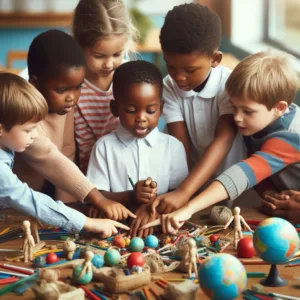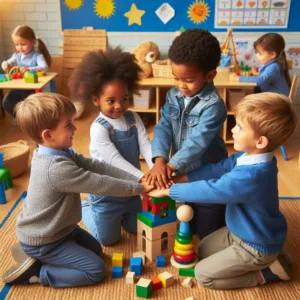Nurturing Social Skills and Empathy

The Importance of Developing Emotional Intelligence in Preschoolers
As parents and educators, we recognize that the early years of a child’s life are crucial for their overall development.
Beyond academic knowledge, it is essential to focus on nurturing emotional intelligence in preschoolers. Emotional intelligence (EQ) encompasses self-awareness, empathy, and effective interpersonal skills.
Emotional intelligence in preschoolers involves their ability to understand, manage, and express their own emotions, as well as recognize and respond to the emotions of others.
At AppleBee Kids, educators recognize the profound impact of EQ on building healthy relationships, fostering self-awareness, and laying the foundation for a compassionate society.
Why Emotional Intelligence Matters
1. Building Healthy Relationships
Children are like sponges, absorbing experiences and interactions from their surroundings. By nurturing emotional intelligence in preschoolers, we equip them with the tools to form positive relationships.
Children learn to recognize emotions in themselves and others, leading to better communication and conflict resolution.
2. Enhancing Self-Awareness
Emotionally intelligent children understand their feelings and reactions. They can express themselves effectively, whether it’s joy, frustration, or sadness. Self-awareness lays the foundation for healthy emotional regulation.
3. Developing Empathy
Empathy—the ability to understand and share the feelings of others—is a cornerstone of emotional intelligence.
When children learn to empathise, they become kinder, more compassionate individuals. Empathy fosters a sense of community and helps prevent bullying.
Practical Strategies for Nurturing EQ
1. Storytelling and Role-Playing
Engage preschoolers in stories that highlight emotions and empathy.
Use relatable characters and situations to discuss feelings.
Role-playing scenarios allows children to step into someone else’s shoes and practice empathy.

2. Emotional Literacy
Teach children to label their emotions. Use a feelings chart or create one together.
Encourage them to express how they feel, whether it’s happiness, frustration, or fear. Validate their emotions and provide a safe space for expression.

3. Cooperative Play
Structured playtime encourages teamwork and cooperation.
Activities like building with blocks, playing board games, or collaborating on art projects promote social skills.
Children learn to take turns, share, and communicate effectively.
4. Mindfulness and Breathing Exercises
Introduce simple mindfulness techniques to preschoolers. Deep breathing exercises help regulate emotions.
Teach them to pause, take a deep breath, and identify their feelings before reacting.
AppleBee Kids Preschool: A Beacon of Excellence
At AppleBee Kids Preschool, we understand the critical role emotional intelligence plays in a child’s development.
Our nurturing environment fosters social skills and empathy through:
1. Play-Based Learning
Our curriculum integrates play as a powerful tool for emotional growth.
Children engage in cooperative play, learn conflict resolution, and develop empathy while exploring their creativity.
2. Social-Emotional Learning (SEL) Programs
We incorporate SEL programs into daily routines. Through storytelling, art, and music, children learn about emotions, kindness, and friendship.
Our teachers model empathy and encourage open communication.
3. Outdoor Exploration
Time spent outdoors enhances emotional well-being. At our Table View Creche, children connect with nature, learn about seasons, and develop a sense of wonder.
Outdoor play promotes social interactions and resilience.
4. Parent-Teacher Collaboration
We believe in a strong partnership with parents.
Regular communication ensures that emotional development continues seamlessly at home. Workshops and parenting resources empower families to support their child’s EQ journey.
Emotional intelligence in preschoolers is not an isolated skill; it’s a lifelong asset.
By nurturing social skills and empathy in preschoolers, we lay the groundwork for compassionate, resilient adults.
Let’s celebrate the magic of emotional growth and create a generation that thrives both academically and emotionally.
Remember, at AppleBee Kids, we don’t just teach; we nurture hearts and minds.

